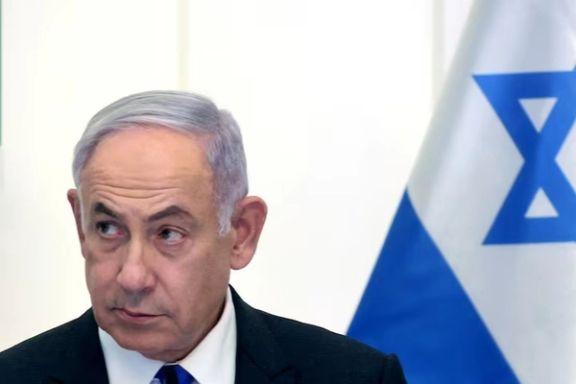Netanyahu to Iran: Attack Israel and suffer ‘heavy price’

Prime Minister Benjamin Netanyahu has dared Iran and its Lebanese proxy group, Hezbollah, to attack Israel and face the consequences.

Prime Minister Benjamin Netanyahu has dared Iran and its Lebanese proxy group, Hezbollah, to attack Israel and face the consequences.
Speaking at the start of a weekly cabinet meeting on SundayNetanyahu issued a warning to Iran and Hezbollah, signaling Israel's readiness to defend itself against any threats from these adversaries.
"We are determined to defend ourselves, and we are also determined to extract a very heavy price from any enemy that dares to attack us, from any theater," Netanyahu stated.
He also underscored Israel’s commitment to its security principles, which he said will remain non-negotiable despite the complex nature of the peace talks. “We are conducting very complex negotiations,” Netanyahu said. “But I want to emphasize: We are conducting negotiations, and not give-and-give. There are areas where we can show flexibility, and there are areas where we can’t show flexibility — and we are standing firm on them. We know quite well how to distinguish between the two.”
These comments come as Israel continues to engage in indirect negotiations with Hamas, mediated by Qatar, the United States, and Egypt. The talks, held in Doha over the past week, are aimed at securing the release of Israeli hostages taken by Hamas during the October 7 attacks that killed approximately 1,200 Israelis. However, significant gaps remain between the two sides, particularly on the key issues of the Philadelphi Corridor, the Rafah Crossing, and the deployment of Israeli Defense Forces (IDF) in Gaza if an agreement is reached.
Netanyahu’s firm stance is consistent with the outline laid out by the White House in May, which has since been the basis for Israel’s negotiating position. Central to these principles is Israel's demand for control over critical border areas to prevent the smuggling of weapons into Gaza and ensure its long-term security. This demand has been a major sticking point in the talks, with Hamas refusing to agree to any arrangement that would allow Israeli forces to remain in Gaza after a potential ceasefire.
Despite the complexities of the negotiations, there has been some optimism among mediators. US Secretary of State Antony Blinken, who arrived in Israel on Sunday for another round of talks, is expected to push for progress, especially since Joe Biden urgently needs the ceasefire as a legacy of his presidency.
However, Hamas has already cast doubt on the prospects of a breakthrough. In a statement released shortly after Blinken's arrival, the militant group accused Netanyahu of setting new conditions to deliberately sabotage the negotiations. “We hold Netanyahu fully responsible for thwarting the mediators’ efforts and obstructing an agreement,” Hamas declared.

Meanwhile, the situation on the ground remains volatile. Israeli fighter jets struck a Hezbollah rocket launcher in southern Lebanon on Sunday evening, in response to an attack on the Upper Galilee. The Israeli Defense Forces (IDF) have also reported ongoing rocket fire from Lebanon into northern Israel, further escalating the conflict with Hezbollah, an Iranian-backed militant group allied with Hamas.
The broader regional implications of the conflict are becoming increasingly apparent. Iran, which has been a key supporter of both Hamas and Hezbollah, has threatened retaliation following the assassination of senior Hamas and Hezbollah figures in Tehran and Beirut, which it attributes to Israel. This escalation comes at a time when the international community is growing increasingly concerned about the potential for the conflict to spill over into a broader regional war.
Iran has reportedly postponed its retaliatory strike on Israel to avoid derailing the ceasefire talks aimed at ending the Gaza war. However, the Islamic Republic has tried to avoid expressing public support for the negotiations and even downplayed the US-led mediation efforts arguing that Washington cannot be an “impartial” mediator as it backs Israel.
Iranian authorities are also skeptical about the support expressed by some Western countries for the people of Israel. A report by the Tehran Times, an Iranian newspaper fully owned and controlled by the government, even claimed that France, Germany, and Britain are considering recognizing Palestine as a state, contingent on significant concessions from Iran, including its recognition of Israel and a halt to support for resistance groups in the region.
“The initiative proposed by Paris and endorsed by London and Berlin aims to offer additional protections for Israel but does not establish any conditions to safeguard Palestinians against Israel's apartheid policies in the occupied territories, its massacres in Gaza, the abuse of Palestinian prisoners, or the growing number of illegal settlements in the West Bank,” the report added.
If the initiative is implemented, wrote the Tehran Times, the European trio will join Norway, Ireland, and Spain, who earlier this year became the latest group of European countries to recognize Palestine as a state.